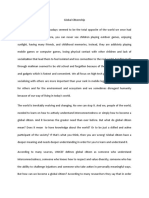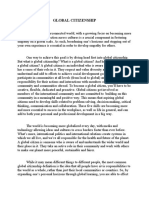Global Citizenship
Global Citizenship
Uploaded by
Gago SayoCopyright:
Available Formats
Global Citizenship
Global Citizenship
Uploaded by
Gago SayoCopyright
Available Formats
Share this document
Did you find this document useful?
Is this content inappropriate?
Copyright:
Available Formats
Global Citizenship
Global Citizenship
Uploaded by
Gago SayoCopyright:
Available Formats
What is Global Citizenship ?
Global citizenship is the umbrella term for social, political, environmental, and economic actions of globally minded individuals
and communities on a worldwide scale. The term can refer to the belief that individuals are members of multiple, diverse, local and non-
local networks rather than single actors affecting isolated societies. Promoting global citizenship in sustainable development will allow
individuals to embrace their social responsibility to act for the benefit of all societies, not just their own.
Global citizenship is all about encouraging young people to develop the knowledge, skills and values they need to engage with
the world. And it's about the belief that we can all make a difference.
Benefits to Students
Global citizenship means an awareness of the interconnectedness among people, societies and environments around the globe. It
emphasizes responsibilities and contribution to a global society and economy. When students develop a sense of global citizenship,
they learn to respect seminal universal values such as peace, sustainability and upholding the human rights and dignity of all
people. Global citizenship programs develop students' knowledge, skills, attitudes and values. Effective schools draw on real-life
intercultural experiences which deepen students' understanding of the world and their place in it.
How to be a Global Citizen
A global citizen is someone who is aware of and understands the wider world – and their place in it. They take an active role
in their community and work with others to make our planet more peaceful, sustainable and fairer.
Education for global citizenship isn't an additional subject – it's a framework for learning, reaching beyond school to the
wider community. It can be promoted in class through the existing curriculum or through new initiatives and activities.
Benefits of Being a Global Citizen
A global citizen will:
Build their own understanding of world events.
Think about their values and what's important to them.
Take learning into the real world.
Challenge ignorance and intolerance.
Get involved in their local, national and global communities.
Develop an argument and voice their opinions.
See that they have power to act and influence the world around them.
What's more, global citizenship inspires and informs teachers and parents, too. But above all, it shows young people that they have
a voice. The world may be changing fast, but they can make a positive difference – and help build a fairer, safer and more secure
world for everyone.
References:
https://www.oxfam.org.uk/education/who-we-are/what-is-global-citizenship/#:~:text=A%20global%20citizen%20is%20someone,more
%20peaceful%2C%20sustainable%20and%20fairer.
https://www.un.org/en/academic-impact/global-citizenship
You might also like
- Test Bank Chapter 14: Team Leadership: Ultiple Hoice100% (2)Test Bank Chapter 14: Team Leadership: Ultiple Hoice26 pages
- The Aim of Global Citizenship Education Is To Enable ActiveNo ratings yetThe Aim of Global Citizenship Education Is To Enable Active5 pages
- Developing A Person As A Responsible Global CitizenNo ratings yetDeveloping A Person As A Responsible Global Citizen2 pages
- Perspective of Global Education - Global Citizenship EducationNo ratings yetPerspective of Global Education - Global Citizenship Education14 pages
- Title: The Transformative Power of Education: Shaping Minds, Building FuturesNo ratings yetTitle: The Transformative Power of Education: Shaping Minds, Building Futures2 pages
- A Reflection For Multicultural and GlobalizationNo ratings yetA Reflection For Multicultural and Globalization13 pages
- Oxfam Education For Global Citizenship A Guide For Schools100% (1)Oxfam Education For Global Citizenship A Guide For Schools12 pages
- Social Studies Module 1B Civics and CultureNo ratings yetSocial Studies Module 1B Civics and Culture2 pages
- Group8 - Global Citizenship - Written ReportNo ratings yetGroup8 - Global Citizenship - Written Report3 pages
- The Importance of Global Education in The Modern World 5No ratings yetThe Importance of Global Education in The Modern World 51 page
- The Contemporary World: Prepared By: Izabelle Joy A. Algar, LPTNo ratings yetThe Contemporary World: Prepared By: Izabelle Joy A. Algar, LPT10 pages
- Education For Global Citizenship A Guide For SchoolsNo ratings yetEducation For Global Citizenship A Guide For Schools12 pages
- Oxfam Getting Started With Global Citizenship Guide For TeachersNo ratings yetOxfam Getting Started With Global Citizenship Guide For Teachers20 pages
- Citizenship Education For Better World SocietiesNo ratings yetCitizenship Education For Better World Societies20 pages
- Getting Started With Global Citizenship: A Guide For New TeachersNo ratings yetGetting Started With Global Citizenship: A Guide For New Teachers20 pages
- Education Is A Fundamental Pillar of Society That Shapes Individuals and CommunitiesNo ratings yetEducation Is A Fundamental Pillar of Society That Shapes Individuals and Communities2 pages
- The Importance of Global Education in The Modern WorldNo ratings yetThe Importance of Global Education in The Modern World1 page
- Multigrade Daily Lesson Plan Science Week 2No ratings yetMultigrade Daily Lesson Plan Science Week 234 pages
- Sustainable Fisherman Settlement DevelopmentNo ratings yetSustainable Fisherman Settlement Development10 pages
- Reflections On Implementing Industrial Ecology Through Eco-Industrial Park DevelopmentNo ratings yetReflections On Implementing Industrial Ecology Through Eco-Industrial Park Development13 pages
- Download Full Meat, Mercy, Morality: Animals and Humanitarianism in Colonial Bengal, 1850-1920 Samiparna Samanta PDF All Chapters100% (3)Download Full Meat, Mercy, Morality: Animals and Humanitarianism in Colonial Bengal, 1850-1920 Samiparna Samanta PDF All Chapters76 pages
- Đề Thi Thử Tuyển Sinh Lớp 10 Trung Học Phổ Thông 2No ratings yetĐề Thi Thử Tuyển Sinh Lớp 10 Trung Học Phổ Thông 24 pages
- Thesis About Solid Waste Management in The Philippines75% (4)Thesis About Solid Waste Management in The Philippines5 pages
- Complete Download The Water Cycle 1st Edition - Ebook PDF PDF All Chapters100% (4)Complete Download The Water Cycle 1st Edition - Ebook PDF PDF All Chapters41 pages
- Ministry of Forests, Lands, and Natural Resource Operations Province of British Columbia Federal Bi-Weekly ListNo ratings yetMinistry of Forests, Lands, and Natural Resource Operations Province of British Columbia Federal Bi-Weekly List41 pages
- La Mesa Eco Park Is A Tranquil Oasis Amid The BusyNo ratings yetLa Mesa Eco Park Is A Tranquil Oasis Amid The Busy2 pages
- Smart Farming Technology Innovations - Insights and Reflections From The German Smart-AKIS HubNo ratings yetSmart Farming Technology Innovations - Insights and Reflections From The German Smart-AKIS Hub10 pages
- Understanding The Diversity of International Carbon Pricing Initiatives Under The Paris AgreementNo ratings yetUnderstanding The Diversity of International Carbon Pricing Initiatives Under The Paris Agreement8 pages

























































































